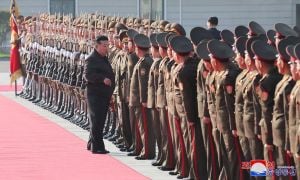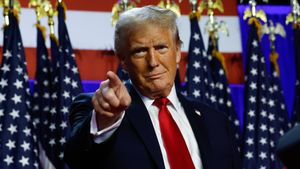Days have turned to weeks and weeks have stretched to nearly three years since the beginning of Russia's war against Ukraine, and still, the conflict shows no signs of abatement. On November 6, 2024, the situation remains dire as Russia intensifies its military efforts against Ukraine, prompting fears of broader instability.
Recent attacks have showcased Russia's brazen determination to crush Ukrainian resistance. Just last Wednesday, Ukrainian officials reported missile strikes on the southeastern city of Zaporizhzhia, resulting in six fatalities and at least 20 injuries. The assault also obliterated key infrastructure, sending shockwaves through local communities and highlighting the relentless nature of Russian aggression.
Meanwhile, Ukraine is not standing idle. They mounted retaliatory measures, including drone strikes against Belgorod, Russia, which left one civilian injured and ignited fires across three apartments. This tit-for-tat approach exemplifies the constant back-and-forth between the two nations, where civilians on both sides bear the brunt of the fighting.
Adding to this harrowing mix, reports are surfacing about the involvement of North Korean troops aiding Russia's efforts, with conservative estimates stating more than 10,000 of their soldiers are stationed near the front lines. Ukrainian President Volodymyr Zelenskyy described any engagement involving these forces as "opening a new page of instability" worldwide. Such developments have drawn concern from foreign ministers of the Group of Seven democracies, who labeled the North Korean presence as a potentially dangerous escalation.
Internationally, policies of major players continue to shape the narrative of the war. Russian Foreign Minister Sergey Lavrov recently warned of the seriousness of NATO's role, stating Russia will employ "all possible means to defend itself" against perceived NATO aggressions. This belligerent rhetoric only fuels worries about potential conflicts extending far beyond Ukraine.
On the intelligence and espionage front, authorities are investigating connections linked to Belarus, with Polish prosecutors indicting two individuals suspected of working with Belarusian intelligence, underscoring the web of international intrigue and the effects of the conflict extending well beyond Ukraine’s borders.
Domestically, Russia is doubling down on its military industrial complex, with reports of severe penalties for those who breach loyalty to the state agencies, such as jail sentences for factory engineers spilling secrets to Ukraine.
All this has unfolded amid the backdrop of the upcoming U.S. elections, poised to redefine foreign policy, particularly concerning the support for Ukraine. Kamala Harris and Donald Trump present starkly different paths. Harris promises to sustain military aid to Ukraine, pulling on the U.S. commitment from the Biden administration, which has delivered $64.1 billion since the onset of the invasion. Meanwhile, Trump has vague intentions of engaging both Russia and Ukraine for peace, often emphasizing negotiations but showing skepticism toward U.S. aid. Decisions made post-election could shift the strategic consensus on support for Ukraine.
Importantly, analysts warn about the overarching aim of Russian President Vladimir Putin. Despite Western sanctions and international condemnation, analysts assert he's positioned himself to gain more from prolonging the war than from seeking any swift resolution. Robert Dover, Professor of Intelligence and National Security at the University of Hull, notes, “Ukraine seems to be highly strained by the conflict,” hinting at the fragile state of Ukrainian resilience under relentless Russian attacks.
What lies at stake is not just the territorial integrity of Ukraine but also the broader geopolitical ramifications of the conflict, with pundits raising alarms about waning support and divided opinions on NATO commitments among U.S. political leaders. Critics contend reducing aid to Ukraine could embolden Russia’s ambitions, signaling a green light for potential similar strategies against other neighbors.
Putin seems to be playing the long game. With his eyes on the broader geopolitical chessboard, he's utilizing the surging tensions elsewhere, such as looming conflicts involving China and the Middle East, as distractions to maintain his campaign against Ukraine. Perceptions over the next few months will be shaped significantly by election outcomes, troop movements—and the ever-tenuous situation on the ground.
Ukraine finds itself at the crossroads, desperately seeking military aid to fend off aggressions. Meanwhile, Russia’s gamble rests on outlasting Western solidarity and military support for Ukraine, with unpredictable outcomes likely not just for Ukraine, but for global peace and security.



